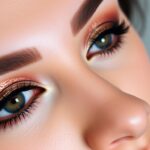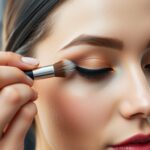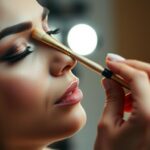Ever found yourself staring in the mirror, frustrated by those pesky white flakes on your shoulders? You’re not alone. About 50% of adults face scalp issues that make them feel self-conscious and uncomfortable. Knowing the difference between dandruff and dry scalp can change your scalp care game.
Dandruff isn’t just about embarrassing flakes. It’s a complex condition affecting about 1 in 5 adults. It’s often triggered by the Malassezia yeast that lives on most people’s skin. This tiny organism can cause an inflammatory response, leaving your scalp irritated and your hair looking less than its best.
The right anti dandruff shampoo can be a powerful tool in managing these scalp challenges. Whether you’re dealing with oily, yellow flakes from dandruff or small, dry white flakes from a dry scalp, understanding the root cause is key. This is crucial for effective dandruff treatment and scalp care.
In this comprehensive guide, we’ll dive deep into the world of scalp health. We’ll help you identify, understand, and effectively manage these common yet frustrating conditions. Get ready to say goodbye to embarrassing flakes and hello to a healthier, more confident you!
Table of Contents
Understanding Dandruff
Dandruff is a common scalp condition that affects nearly half of the global adult population. It’s important to understand its causes to manage it better.

Dandruff often starts during puberty when oil glands become more active. Men are more likely to get it because their skin is naturally oilier. The main cause is an overgrowth of malassezia, a yeast-like fungus on the scalp.
What is Dandruff?
Dandruff is marked by an itchy scalp with white or yellowish flakes. These flakes can also appear on eyebrows, beards, and behind the ears. Seborrheic dermatitis is a more severe form, causing intense irritation and skin inflammation.
Causes of Dandruff
- Malassezia yeast overgrowth
- Hormonal changes
- Sensitivity to hair care products
- Stress and emotional factors
- Cold and dry weather conditions
Symptoms to Identify Dandruff
Spotting dandruff early is key to managing it. Look out for these signs:
- Persistent white or yellow flakes
- Itchy scalp
- Oily or dry skin patches
- Irritated skin around the scalp
“Understanding your scalp’s unique characteristics is the first step toward effective dandruff management.” – Dermatology Experts
Dandruff symptoms get worse in fall and winter due to dry air. Using an anti-dandruff shampoo with zinc pyrithione or ketoconazole can help. Experts say to use these shampoos for four to six weeks to see big improvements.
Exploring Dry Scalp
Knowing about your scalp’s health is key to having great hair. Dry scalp is common and can make your hair look bad. It’s different from dandruff and needs special care to get better.
What is a Dry Scalp?
A dry scalp happens when your scalp doesn’t get enough moisture. This leads to flaking, irritation, and a tight feeling. Unlike dandruff, dry scalp flakes are smaller and drier, not sticking as much.
Common Causes of Dry Scalp
- Cold, dry weather conditions
- Over-washing hair
- Using harsh hair products
- Dehydration
- Skin conditions like eczema

Symptoms of Dry Scalp
Spotting an itchy scalp early is important. Common signs include:
- Tight, uncomfortable scalp sensation
- Small white flakes
- Mild to moderate itching
- Skin irritation
“Maintaining scalp hydration is key to preventing dry scalp and promoting healthy hair growth.” – Dermatology Experts
| Treatment Option | Price Range | Key Benefits |
|---|---|---|
| Scalp Hydration Serum | $40-$43 | Increases scalp hydration up to 144% |
| Moisturizing Scalp Treatment | $38-$160 | Nourishes and protects scalp |
| Hydrating Scalp Spray | $40 | 24-hour moisture protection |
Dealing with dry scalp needs a full plan. Drink plenty of water, use gentle hair products, and try special scalp treatments. This will help bring back moisture and comfort.
Key Differences Between Dandruff and Dry Scalp
Knowing the differences between dandruff and dry scalp is key to the right treatment. They might look similar, but they affect your scalp care in different ways.
Flaky Appearance: Understanding the Variations
The main difference is in how flakes look:
- Dandruff flakes are bigger, oily, and yellowish-white
- Dry scalp flakes are smaller, whiter, and drier
- Dandruff flakes stick more to hair and scalp

Itchiness Levels: Comparing Scalp Irritation
Both can make your scalp itch, but the itch is different:
- Dandruff itch is intense and lasts longer
- Dry scalp itch feels tight and mild
- Scratching makes both worse
Scalp Condition: Root Causes Explored
It’s important to know what’s causing your scalp problem:
- Dandruff comes from too much oil and fungus
- Dry scalp is due to not enough moisture
- Seborrheic dermatitis can cause dandruff
“Knowing the difference between dandruff and dry scalp is the first step toward effective scalp care.” – Dermatology Experts
Figuring out your scalp issue helps you pick the right treatment. This way, you can get your scalp back to health faster.
Factors Contributing to Dandruff
Dandruff is a common scalp condition that affects millions of people worldwide. Knowing what causes it can help you find the right treatment. It also improves your scalp care.
Figuring out what causes dandruff can be tricky. Many things can lead to this scalp problem. Let’s look at the main factors that cause dandruff and seborrheic dermatitis.
Malassezia Fungus: The Microscopic Culprit
The Malassezia fungus is a big player in dandruff. It’s found on almost all adults’ scalps. But, when it grows too much, it becomes a problem. Here are some key points:
- Naturally occurs on the scalp
- Feeds on skin oils
- Triggers inflammation and rapid skin cell turnover
Skin Conditions Influencing Dandruff
Some skin conditions make you more likely to get dandruff. Seborrheic dermatitis is a big one. It causes red, scaly patches and too much skin cell production.
| Skin Condition | Dandruff Impact |
|---|---|
| Seborrheic Dermatitis | High inflammation, significant flaking |
| Psoriasis | Increased skin cell turnover |
| Eczema | Scalp irritation and dryness |
Environmental Factors at Play
Things outside of you can also affect your scalp. Cold, dry weather, stress, hormonal changes, and diet can all play a part. Here are some examples:
- Cold, dry weather
- High stress levels
- Hormonal changes
- Certain dietary habits
“Understanding your scalp’s unique characteristics is the first step in effective dandruff management.” – Dermatology Experts
By knowing these factors, you can tackle dandruff better. You can also keep your scalp healthy.
Factors Contributing to Dry Scalp
Knowing what causes dry scalp helps you take better care of your scalp. Many things, like the weather and what you use on your hair, can affect your scalp’s moisture.

Weather Impacts on Scalp Health
Cold and dry weather makes scalp care harder. Low humidity takes away moisture from your scalp and hair. This can cause:
- Increased skin dryness
- Reduced natural oil production
- Potential scalp irritation
Harsh Hair Products and Their Effects
Some hair products have harsh chemicals that harm your scalp. Sulfates, alcohol-based styling products, and high-heat styling tools dry out your scalp by removing moisture.
“Your scalp’s health is a reflection of your overall hair care routine.” – Dermatology Experts
Dehydration and Dietary Influences
Drinking enough water and eating well are key for a healthy scalp. Not drinking enough water or not eating the right foods can dry out your scalp.
| Dietary Factor | Impact on Scalp |
|---|---|
| Water Intake | Directly affects skin hydration |
| Omega-3 Fatty Acids | Supports scalp moisture retention |
| Vitamin E | Promotes scalp health and healing |
Understanding these factors helps you prevent and manage dry scalp. You can use this knowledge to improve your hair care routine.
How to Diagnose Dandruff
Knowing why your scalp flakes is key to treating dandruff. About 50% of adults get dandruff at some time. Spotting the signs and getting a proper diagnosis can help manage it.

To diagnose dandruff, you need a mix of a doctor’s check-up and watching your scalp at home. Start by learning about dandruff and what might cause it.
Professional Scalp Examination
A dermatologist can give you the best diagnosis for scalp problems. They will:
- Look at your scalp closely
- Do a skin scraping test
- Check the flakes’ type and how bad they are
- Look for other skin issues
“Nearly 80% of dermatologists believe stress can make seborrheic dermatitis worse, making getting a professional diagnosis important,” notes leading scalp health experts.
Home Tests for Dandruff
Even though seeing a doctor is best, you can do some tests at home:
- Look at the flakes:
- Dandruff flakes: Big, oily, white or yellow
- Dry scalp flakes: Small, dry, white specks
- Keep track of your scalp symptoms:
- Itchy scalp
- Scalp redness
- Oily scalp look
| Diagnostic Method | Key Indicators | Recommended Action |
|---|---|---|
| Visual Inspection | Flake color and size | Initial self-assessment |
| Professional Examination | Skin scraping test | Comprehensive diagnosis |
| Symptom Tracking | Scalp condition changes | Monitor treatment effectiveness |
Good scalp care starts with knowing your scalp’s condition. If your symptoms don’t get better or get worse, see a dermatologist.
How to Diagnose Dry Scalp
Spotting a dry scalp can be tricky, but knowing the signs helps you care for your scalp. Your scalp’s health is key to keeping your hair healthy and comfortable.

Signs to Look For
A dry scalp shows several clear signs:
- Small, white flakes that are dry and powdery
- Noticeable scalp tightness or feeling of discomfort
- Itchy scalp with mild to moderate irritation
- Skin that appears slightly red or sensitive
- Occasional skin peeling or mild scaling
“Cold, dry air can absorb moisture from the scalp, leading to a dry and flaky condition, particularly during winter months.”
When to Seek Professional Advice
Some dry scalp problems can be handled at home, but others need a doctor’s help. See a dermatologist if you have:
- Persistent itchy scalp lasting more than two weeks
- Severe scalp irritation or inflammation
- Significant hair loss accompanying dry scalp symptoms
- Signs of infection or unusual scalp changes
| Symptom Severity | Recommended Action |
|---|---|
| Mild Dryness | Home treatments and moisturizing products |
| Moderate Symptoms | Specialized scalp care products |
| Severe Condition | Professional dermatological consultation |
Remember, dry scalp can be a sign of underlying health conditions. Drinking plenty of water, using gentle hair products, and eating well can help your scalp health.
Treatment Options for Dandruff
Dealing with dandruff can be frustrating, but there are many effective treatments. Knowing the right treatment can help you get rid of those annoying white flakes.
Over-the-Counter Anti-Dandruff Shampoos
Choosing the right anti-dandruff shampoo is key for scalp health. Most medicated shampoos have strong ingredients that target different causes of dandruff.
- Zinc Pyrithione: Kills bacteria and fungus
- Ketoconazole: Strong antifungal agent
- Salicylic Acid: Reduces scalp scales
- Selenium Sulfide: Effective against fungus
- Coal Tar: Slows skin cell shedding
“More than 50 million Americans deal with dandruff year-round” – National Institutes of Health
Prescription Treatments
If over-the-counter treatments don’t work, you might need prescription meds. Dermatologists might suggest:
- Fluocinolone (corticosteroid)
- Calcineurin inhibitors
- Specialized medicated shampoos

Lifestyle Changes
Managing dandruff isn’t just about treatments. Your daily habits play a big role in scalp health.
| Lifestyle Factor | Recommended Action |
|---|---|
| Stress Management | Practice meditation, exercise regularly |
| Diet | Consume balanced nutrition, stay hydrated |
| Hair Washing | Adjust frequency based on scalp type |
With consistent care and the right treatment, you can manage and reduce scalp flaking. Remember, everyone’s scalp is different. You might need to try a few things to find what works best for you.
Treatment Options for Dry Scalp
Dealing with a dry scalp can be frustrating. But, there are many effective treatments to help. The right treatment depends on your scalp’s needs and the cause.

Moisturizing Shampoo Solutions
Choosing the right moisturizing shampoo is key. Look for shampoos with ingredients like:
- Shea butter for deep hydration
- Coconut oil to reduce inflammation
- Aloe vera for soothing properties
Powerful Home Remedies
Natural treatments can help a lot. Try these home remedies:
- Apple cider vinegar rinse (antimicrobial properties)
- Coconut oil scalp massage
- Tea tree oil treatment (diluted with carrier oil)
*”92% of participants reported that Scalp Care Dry Scalp Treatment instantly soothed their scalp.”*
Advanced Hydration Techniques
Scalp care is more than just shampoo. Try these hydration tips:
| Technique | Benefit | Frequency |
|---|---|---|
| Increased Water Intake | Internal Hydration | Daily |
| Humidifier Usage | Moisture Retention | Nightly |
| Gentle Scalp Exfoliation | Remove Dead Skin | Weekly |
A 2021 study found an ointment with probiotics, honey, turmeric, and vitamin B12 helped. It showed scalp dryness can improve in four weeks with regular treatment.
If your dry scalp doesn’t get better in two weeks, see a dermatologist. They can give you advice tailored to your hair care needs.
Preventing Dandruff
Dandruff can be a big scalp care challenge for many. Using the right prevention methods can keep your scalp healthy and lower dandruff chances. Knowing how to care for your hair is key to managing dandruff.

Scalp Hygiene Tips
Good scalp hygiene is key for dandruff treatment. Here are important steps:
- Wash your hair at least twice a week with an anti-dandruff shampoo
- Avoid overwashing, which can irritate the scalp
- Use lukewarm water to prevent scalp dryness
- Gently massage your scalp during washing to improve circulation
Diet and Supplements
Your diet affects scalp health. Some nutrients fight dandruff:
- Increase intake of B vitamins and zinc
- Consume foods rich in omega-3 fatty acids
- Stay hydrated by drinking plenty of water
- Consider probiotic supplements to support scalp microbiome
“A balanced diet is your first line of defense against scalp issues.” – Dermatology Experts
Stress Management
Stress can make dandruff worse. Here are ways to reduce stress:
- Practice regular meditation or deep breathing exercises
- Engage in consistent physical activity
- Maintain a consistent sleep schedule
- Consider counseling or stress management workshops
By using these hair care tips, you can lower dandruff risk and keep your scalp healthy.
Preventing Dry Scalp
Keeping your scalp healthy is key. Dry scalp can be a real nuisance. But, with the right steps, you can keep your scalp moist and balanced all year.
Hydration Tips for Scalp Care
Starting from the inside out is the best way to prevent dry scalp. Your hair care should include both internal and external hydration:
- Drink at least 8 glasses of water daily
- Eat foods that are full of water, like cucumbers and watermelon
- Use a humidifier in dry places
- Try to limit alcohol and caffeine
Choosing the Right Hair Products
Choosing the right hair products is very important for scalp health. Look for gentle, moisturizing products that help keep your scalp balanced.
| Shampoo | Active Ingredient | Price | Key Benefits |
|---|---|---|---|
| Jupiter Hydrating Shampoo | Glycerin | $32 | Moisturizing, scalp-friendly |
| Dove Dryness & Itch Relief | Zinc Pyrithione | $5 | Reduces itchiness |
| CLn Shampoo | Salicylic Acid | $36 | Rebalances scalp microbiome |
Seasonal Care Practices
Your dry scalp care should change with the seasons:
- Winter: Use richer, more moisturizing products
- Summer: Choose lightweight, breathable products
- Protect your scalp from extreme temperatures
- Adjust how often you wash your hair based on the season
“Healthy scalp care is a year-round commitment that requires understanding your unique needs.” – Dermatology Experts
Myths and Misconceptions
Getting to know scalp health means knowing what’s real and what’s not. Many people have wrong ideas about dandruff and dry scalp. These ideas can make it hard to take care of their hair right.
Debunking Dandruff Myths
One big myth is that dandruff comes from being dirty. This is completely untrue. Dandruff can be caused by many things, like:
- Too much Malassezia fungus
- Conditions like seborrheic dermatitis
- Stress and changes in hormones
- Being sensitive to certain hair products
Dry Scalp Misconceptions
Many people don’t get why they have a dry scalp. It’s not just about not using enough moisturizer. It can be caused by:
- Things around us
- Strong anti dandruff shampoos
- Lacking important nutrients
- Underlying skin problems
“More than 50% of people experience dandruff at some point in their lives” – Mayo Clinic
Scalp Care Truths
Good hair care is more than just myths. Knowing what your scalp needs is key to healthy hair. Not all anti dandruff shampoos work the same for everyone. Finding what works for you is important.
| Myth | Reality |
|---|---|
| Dandruff means dirty hair | Dandruff is a skin condition, not a hygiene issue |
| All dry scalp treatments are identical | Scalp care requires personalized approaches |
| Frequent washing eliminates dandruff | Balanced washing and proper products are essential |
By knowing these myths, you can make a better hair care plan. One that fits your scalp’s needs.
When to See a Professional
Scalp care can be tough, especially when treatments don’t work. It’s key to know when to get help for your scalp’s health.
Dandruff and seborrheic dermatitis are tricky. While many find relief with over-the-counter products, some need a doctor’s care.
Persistent Symptoms to Watch For
It’s time to see a pro if you notice:
- Flakes that don’t get better after 2-3 weeks
- Intense itching or irritation
- Visible scalp inflammation
- Scaling that’s not typical for dandruff
- Signs of seborrheic dermatitis
Severe Cases Requiring Medical Intervention
For serious cases, a dermatologist is a must when:
- Dandruff shampoos don’t work after trying them
- Scalp pain or unusual patches appear
- Significant hair loss happens with dandruff
- Symptoms hint at a fungal or bacterial infection
“Early professional intervention can prevent more serious scalp conditions and provide targeted, effective treatment strategies.”
A dermatologist can do tests to find out what’s wrong. They might suggest stronger treatments or special scalp care plans.
Don’t ignore scalp problems. They could mean something bigger is going on. Seeing a pro helps get the right diagnosis and treatment.
Conclusion
It’s important to know the difference between dandruff and dry scalp for good hair care. Your scalp health affects your hair’s overall condition. So, it’s key to spot and tackle specific symptoms.
Key Differences Recap
Dandruff and dry scalp might look alike, but they need different treatments. Here’s what you need to know:
- Dandruff causes oily, yellow-white flakes from too much fungus
- Dry scalp has smaller, whiter flakes from losing moisture
- Dandruff needs medicated shampoo
- Dry scalp does well with hydration and gentle care
Final Recommendations for Scalp Health
Choosing the right hair care depends on your scalp’s condition. Follow these expert tips:
- See a dermatologist for ongoing scalp problems
- Pick an anti dandruff shampoo that fits your symptoms
- Keep your scalp clean regularly
- Watch what you eat and manage stress
“Your scalp is the foundation of healthy hair. Treat it with care and attention.” – Dermatology Experts
Studies show men get dandruff more often because of more sebum and less ceramide. But, proactive scalp care is key for everyone to keep hair healthy.
Personalized Care Approach
| Scalp Condition | Recommended Treatment | Frequency |
|---|---|---|
| Dandruff | Medicated anti-dandruff shampoo | 2-3 times per week |
| Dry Scalp | Moisturizing hair care products | As needed, with gentle washing |
Keep in mind, everyone’s experience is different. Be patient, consistent, and listen to your scalp’s needs for the best hair care.
Additional Resources
Finding the right dandruff treatment can be tough. But, with the right shampoo, you can manage your scalp care. Experts suggest several top products to fight scalp issues. Neutrogena T/Sal Therapeutic Shampoo has 3% salicylic acid, great for seborrheic dermatitis and psoriasis.
Head & Shoulders Clinical Strength Dandruff Defense Shampoo is another strong choice. It has 1% selenium sulfide to fight dandruff well. Jupiter Balancing Shampoo is also great, with 1% zinc pyrithione for mild to moderate dandruff. These are just a few of the many scalp care options out there.
Recommended Products for Dandruff
If you prefer natural options, try Briogeo Scalp Revival Dandruff Relief Charcoal Shampoo. It has 3% salicylic acid and is 92% naturally derived. Tea tree oil is also a natural winner, known for fighting dandruff with its antibacterial and anti-inflammatory effects.
Expert Articles on Scalp Health
Keep up with new scalp care info from dermatologists and hair experts. If your dandruff doesn’t go away after a few weeks, see a doctor. Your path to a healthy scalp starts with knowledge, the right products, and regular care.






